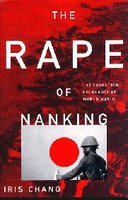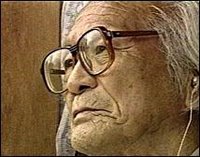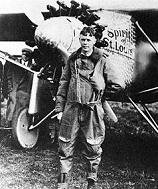
Chris Langan is one of the smartest people in America—his reported IQ is said to be off the charts. Yet, if it's a criterion of anything at all, he has not made it big in the business world. At the time this is written he’s in his mid 40’s, works as a part-time bouncer at a bar and lives in a one room home. He claims that he manages to support himself on only $6000 a year.
From a modest background, Chris had an abusive father. His exceptional intelligence only seemed to heighten the problems in their relationship.
Langan says that being a genius does not necessarily make life easy. Although he has never cared much about money, he explains that his lack of a consistent and professional career path is a result of negative experiences in school.
The following is excerpted from
On 20/20 Downtown, no date given, in which Cynthia McFadden moderated for Langan, who answered questioners. The account states that he is working on a mathematical and philosophical book that will present his theory of the universe.
As an online chat Langan answered posted questions.
Questioner--How do you think you can prove the existence of God using mathematics?
Chris Langan--You have to prove that the universe is a self-referential system. Then you have to examine the attributes of this system, analyze the system to determine how it behaves. It turns out that in certain ways it behaves mentally like a mind. The natural question to ask then is: whose mind are we talking about? The answer to that question is the mind of God.
Questioner--What is the correlation between genius and IQ? between motivation and IQ?
Chris Langan--There appear to be aspects of motivation in intelligence. Whether or not these show up in IQ depends on the test that is taken. For some tests, motivation is a factor; for others it isn't. The ones for which motivation is not a factor, are those that tend to measure mental reflexes. However, even mental reflexes can be depressed for a variety of reasons. So if one's motivation is lacking, one should always be retested when it's high.
Questioner--What is the extent of your education? Did you ever go to college? Why or why not? If you did, how did your relationship with other people change?
Chris Langan--I graduated from high school. I got an academic scholarship to college which lasted for one year. Lost it due to a bureaucratic oversight, and paid my own way back to college for a little under 2 quarters after that. By that time, I'd had a sufficient number of negative experiences in academia that I didn't want to go back. However, although I remain disappointed with academic bureaucracy, I understand that it's a system from which some people have much to gain.
Questioner--Have you read any Hindu or Buddhist texts relating organization of the universe? I've read that similiar texts have inspired Tesla.
Chris Langan--Yes I have read such texts, and have found remarkable insights in them, and yes I have been inspired by them.
Questioner--Are you a member of MENSA?
Chris Langan--No. I never joined Mensa. The first high IQ society I joined was the Mega society, with a much higher cutoff than Mensa's. Whereas Mensa has a cutoff of 1 in 50, the Mega society has a cutoff of 1 in 1 million. Subsequently I joined the Prometheus Society which has a cutoff of 1 in 30,000 and the Triple 9 Society which has a cutoff of 1 in 1,000. Together, these and other high cutoff societies form what is called the Superhigh-IQ Community. The Mega Foundation is working to develop the Superhigh-IQ Community on a global level.
Questioner--Does language limit our thought?
Chris Langan--Most people think that a language must be a natural, spoken or written language like English, French or German. But in mathematics and logic, the definition of language is far more general. Reality itself can be viewed as a language, and the language of thought is closely related to that of reality at large. So we might just as well say that the language of thought, rather than limiting our ability to understand reality at large, facilitates it. However, if one's mental language is artificially constrained, then one's insight and creativity may indeed be impaired. The surest proof against this is an open mind and a desire to learn. Samuel--Hi Chris, you mentioned that the universe behaves in certain ways like a mind. Can you elaborate on this?
Chris Langan--The mind works according to the principals of mathematics, including inductive and deductive logic. This goes back to Kant who held that the human mind has categories of perception and cognition. These categories are constraints on phenomenal reality. But phenomenal reality is the only reality we can know. Therefore, constraints on mind function as constraints on reality and systems that function according to similar constraints are similar in function.
Questioner--Chris, Do you believe in creation science or evolution?
Chris Langan--I believe in the theory of evolution, but I believe as well in the allegorical truth of creation theory. In other words, I believe that evolution, including the principle of natural selection, is one of the tools used by God to create mankind. Mankind is then a participant in the creation of the universe itself, so that we have a closed loop. I believe that there is a level on which science and religious metaphor are mutually compatible. Questioner--Do you play an instrument, draw, paint, etc??
Chris Langan--Yes I do. My main instrument is the guitar. I own several electric guitars including a Les Paul, and a Gibson bass guitar. I've also played the piano, although I took it up too late to be especially good at it. I own a synthesizer, that is an electronic keyboard. In fact, I've even played the drums! Most recently I've been into composing music on my computer. There are now a number of good programs that will let you do this. In addition, I draw and occasionally sculpt. I've also written a novel or two, now molding in the bottom drawer of my desk and I love to write songs and poetry. I guess I'm just a romantic at heart.
Moderator of questioning--Chris do you have any final thoughts?
Chris Langan--I'm very concerned about helping others who face some of the problems that I faced when I was growing up. That's what the Mega Foundation [an organization he founded] is about--gifted people helping gifted people. The profoundly gifted are the greatest and most cost effective resource that we as a species possess, and we should do everything in our power to see that they are not wasted. At the same time, every human being, regardless of IQ, has a microcosm in his or her mind and the abilities of ordinary people are in a sense as important as those of the gifted. If we all work together to solve the world's problems, future generations of mankind will have a much healthier planet to inherit















